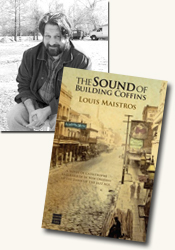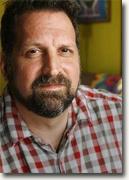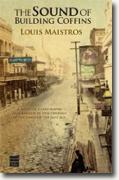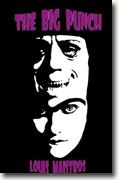author interview
book reviews:
· general fiction
· chick lit/romance
· sci-fi/fantasy
· graphic novels
· nonfiction
· audio books
· author interviews
· children's books @
curledupkids.com
· DVD reviews @
curledupdvd.com
newsletter
win books
buy online
links
home
for authors
& publishiss
for reviewers

|
|||||
 
Louis Maistros discusses the power of magical realism, characters nagging at his subconscious, and the phenomenon of conscience. Interviewer Luan Gaines: What was your inspiration for The Sound of Building Coffins Louis Maistros: Specific instances of inspiration are difficult for me to pin down. The creation of this novel began with a short story I wrote in 2000 called “Can’t No Grave Keep My Body Down” - which ultimately became the final chapter of The Sound of Building Coffins The novel begins with nine-year-old Typhus Morningstar “rebirthing” fetuses in the river. An exorcism is soon to follow. Would you explain why an appreciation of this novel might require some suspension of ordinary belief? Although much of what can be seen and felt in the novel is a realistic depiction of New Orleans at the turn of the century, there is also a heavy element of magic realism present throughout. The reader will get a good sense of what to expect in that regard from the very first chapter, as you mention. Once you get a feel for what the rules of reality vs. super-reality are in the world of the novel, even the more far-out imagery attains a sort of logical order to it. I think what may require “suspension of ordinary belief” is the fact that this is not a straight-up fantasy story; the contrast of impossible imagery against a backdrop of stark reality can be quite jarring, which is the intention.
The unjust death of Dominick’s father, Antonio, is what activates the decades old Vodou curse that lay dormant for so long, its initial manifestation being the possession of young Dominick. Why it comes about in this way is difficult to explain without giving too much away for those who haven’t yet read the novel – but I will say that the domino effect begins with the messenger and not the message, and that the messenger isn’t necessarily who you think it is. The person in question is someone very close to Malvina (the creator of the curse), and this person is not even aware of this relationship till much later in the story. Baptist minister Noonday Morningstar often hears the voice of God. Although clearly instructed to leave the humble home of the Sicilian widow and her baby, he returns to do battle. Why doesn’t Noonday heed God’s very specific warning? This is a central theme of the novel, and one that I’ve been exploring in my own heart for years. I have often wondered about those who claim to have heard the voice of God – and I want to make clear that although I wonder, I never judge. I do think that all humans communicate with God, or our higher power (or whatever you choose to call the object of human faith), in our own unique ways. Most are only aware of the “outgoing” messages, or prayers. But there is also, I think, a very obvious and constant incoming message from our higher power, and that is the phenomenon of “conscience” - that is the in-born knowledge of the difference between right and wrong. In my mind, this gift of conscience is the closest thing that we have to a manifestation of direct contact and communication on a daily basis with a higher power. Which brings up an interesting question: If a person hears, in the more literal sense, the voice of God, and that voice instructs a person to go against that person’s gift of conscience – how does one proceed? Do you follow the voice that you hear with your ears, or the truth that you feel in your heart? Could it be that the voice in your heart disproves the authenticity of the one you hear with your ears – or vice versa? Or are these things related somehow?
“It is the demon himself who must be saved tonight.” Please explain this statement. Another continuing theme of the novel is the idea that nothing in the world is either purely evil or purely good. Noonday determines that the demon may not be entirely what it seems, and that to enlighten rather than destroy an entity perceived as evil might be the only true path to redemption for any of us.
You first introduce Buddy Bolden, the great jazz musician, as a fourteen-year-old boy, his unique sound still evolving. How much of Buddy’s difficult life is determined by his character, how much by his genius and how much by circumstance? What is his fate? My deeply fictionalized portrayal of Buddy Bolden uses some of what is known about the real Buddy Bolden, but there are so many holes in his written history that I took many liberties in my depiction.
Dr. Jack is an abortionist and a witchdoctor that reporter Marshall Trumbo engages to attend the exorcism of the child. What is Trumbo’s motive for selecting Dr. Jack in lieu of another doctor? Marshall Trumbo has a crisis of faith when he witnesses the brutal possession of young Dominick, and sees firsthand how attempted interventions by both doctors and priests are ineffective. As with Noonday Morningstar, he goes against all that he’s been taught regarding the existence of God to do what he believes to be morally correct under the circumstances. Although he’s been taught that it’s a sin to enlist the help of a “witch doctor,” he does so anyway because he wants desperately to relieve the suffering of an innocent. Again, the message is: if you believe in a loving God, you can never do wrong as long as you act unselfishly, never do harm, and always do right to the best of your understanding.  The best way to answer this question is with a brief passage from the book: “Morningstar saw life as a trial and death as a reward, a bridge to paradise—and he saw God’s mysterious afflictions of the body as holy paths to that salvation. Disease may be a source of pain and hardship on earth, but what can be kinder and more blessed than a shortcut to heaven through no fault of your own? What could be a more magnificent display of God’s powers than the merciful, invisible insects that float through the air to infect the body, guiding you to your last breath and on to reward? Typhus Morningstar possesses the gift of sight, his perspective unlimited by the parameters of real life. Does this gift enhance the boy’s life or burden it? How does Typhus view his path? It is interesting that you use the word “sight,” while in the book the word used is “understanding.” Really, for the purposes of Typhus’ part in the story, these words are fairly interchangeable.
Typhus believes he will never enjoy a romantic relationship with a woman because of his small stature. How does a stranger’s photograph assuage his need for a conventional relationship? Is there a penalty for his naiveté? Typhus’ longing for true love is a problem he cannot seem to find an answer to on his own. The problems of others always seem easily solvable to him, but where matters of his own heart are concerned he is confused and almost unreasonably open-minded to the suggestions of others. Unfortunately, he places his faith in Dr. Jack, his friend and mentor, who introduces him to the photograph of Lily. Typhus is so relieved to have something like a romantic relationship, even an imaginary one with an anonymous woman in a photograph, that he allows himself comfort in the acceptance of it. Of course, such an imaginary relationship can’t possibly end well. Part of the unfolding drama in the novel is initiated by Malvina Latour, a voodoo mambo; in fact, various characters are touched by fate long before the confrontation with evil the night of the exorcism. What do such connections reveal about the consequences of impulsive or vengeful actions? As before, a character in this story does a thing that may be viewed as evil – but this “evil” act is committed for all the right reasons. Malvina has acted on her love, and believes she is in the right. But she has also been careless and vengeful, has taken things too far. The repercussions of her actions will be far-reaching and difficult to reverse.
Marcus Nobody Special tells Malaria Morningstar, “That Jim Jam Jump ain’t quite human, darlin’, he done latched onto your brother Dropsy.” Who is Jim Jam Jump and why does Dropsy idolize him? Jim Jam Jump, to me, is a metaphor for the troubled children of New Orleans. In New Orleans we have children who tragically embark on lives of crime at a very young age, some even committing murders; dismissed out-of-hand as irredeemable, with fear and contempt, by many in the community. And yet they are still children. They are not bad, these kids, but they were born into bad circumstances – perhaps even hopeless circumstances (if you believe there is such a thing as “hopelessness,” which I do not) – and they respond to their circumstances in a way that seems logical to a child; in a mode of survival. There comes a time in the life of each child when he is able to make a more informed decision about how to continue his own life-path into adulthood -- but for these troubled children it takes enormous strength of character to break away from the bad hands they’ve been dealt from the beginning. Some make that breakthrough, and some are lost – as is Jim.
Jim feels drawn to Buddy’s cornet because it was the instrument that knocked the demon from his body when he was a baby -- there is a strong subconscious tie there even though he may or may not remember the events of that night in the present. Jim does recognize the power of the music that comes out of the cornet, known as jazz, and understands that the seductive aspects of this new art form can be used to corrupt the hearts of men just as it can be used to enlighten the mind and broaden the spirit. Really, Jim understands the potential of jazz much more clearly than Buddy – who mainly sees it as a way to make a decent living, get free drinks, and win the attention of loose women. Death stalks the pages of The Sound of Building Coffins The unusual relationship that New Orleans has with death, as I see it, is described in depth in Chapter Fifty-Six of the novel. But in more direct terms: I see New Orleans as a town that it is constantly confronted with its own mortality, more so than most other American cities. We live below sea level, surrounded by water; our protective coastline deteriorating while hurricanes get more destructive each year. Our education system and our economic infrastructure breed an endless cycle of poverty, drug trafficking and violence. In New Orleans the presence of death is more obvious than in other places, but our response is not to run and hide from it – instead, we embrace and integrate it into our daily lives. We understand that the cycle of death is complimented by an endless cycle of rebirth. Parades and funerals are interchangeable events. Death’s constant reminders only encourage us to live life to its fullest. The constant presence of death makes our lives more vigorous, more joyful. For those willing to make the sacrifice, it is an even trade. Over the years, all of Morningstar’s children are touched by tragedy, only one blessed with a more hopeful future. Are the fates of these characters specific to your novel or a reflection of life’s patterns in such a place and time? I don’t know a single person in this city who has not been touched deeply by some kind of personal tragedy. Tragedy seems to be part of the common fabric we all share here. With the novel, it was important to me to keep things real in that regard. In real life, people die for stupid reasons. Even children die for stupid reasons. In real life, good people are confronted with horrendous circumstances and do the best they can to find their way through them, sometimes making mistakes along the way, sometimes doing irreparable harm. But through all the trouble and heartache; if a life is lived with urgency, respect and joy; then it is a life worth having lived. As the hurricane of 1906 approaches, the world of the spirit becomes animated, lost souls reunited with their loved ones. How does this merging of the real and the unreal just before the hurricane foretell the imminence of death, a balancing of accounts? It might appear that evil forces have put the storm on its destructive path, but the true cause of the storm is to cleanse the city’s body and soul, and to deliver the message of jazz (be it good or bad) to the rest of the world through the waters of the Spiritworld. In a sense, the negative forces of the novel will ultimately do good by bringing destruction to the city – because only through that destruction is the continuation of life possible.
The Sound of Building Coffins Thank you for your kind words.
Do you have any advice for aspiring writers? Writing and publishing are two almost absurdly incompatible concepts, and yet hand in hand they go. The disclaimer to anything I might say about reconciling these things is this: There are an infinite number of ways to get published, and what worked for me might not necessarily work for you. So take all advice with a grain of salt.
Louis Maistros is a longtime resident of the New Orleans 8th Ward neighborhood. Along with his wife, Elly, he owns and operates Louie's Juke Joint, a combination jazz record shop and Vodou botanica. Maistros is a former forklift operator and a self-taught writer. His work has appeared in the New Orleans Times-Picayune and the Baltimore City Paper. He is mildly self-conscious about the fact that he shares a birthday with Lee Harvey Oswald, and is currently working out a conspiracy theory about that.. Journalist Luan Gaines interviewed author Louis Maistros, author of The Sound of Building Coffins (see accompanying review), about his book for curledup.com. Luan Gaines/2009.
|
|||||
| fiction · sf/f · comic books · nonfiction · audio newsletter · free book contest · buy books online review index · links · · authors & publishiss reviewers |
|
| site by ELBO Computing Resources, Inc. | |


